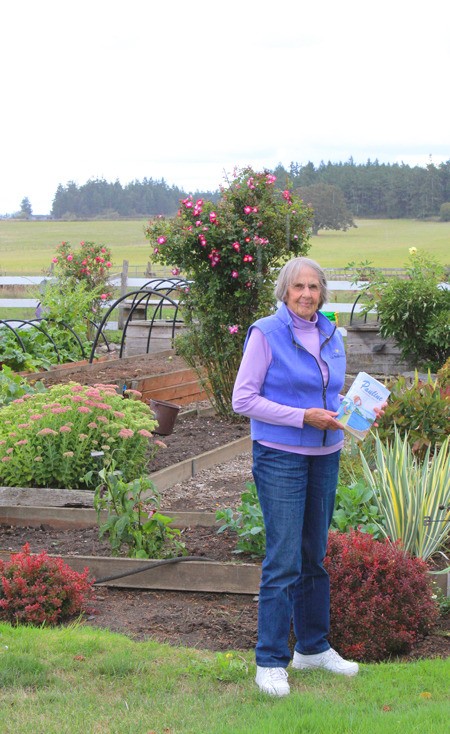From digging for clams to floating the sea aboard makeshift wooden rafts, Avis Rector recalls a childhood that was nothing short of ideal.
“I think I had the most wonderful childhood anyone could ever have,” Rector said during an interview seated at the kitchen table of her childhood home.
Rector’s roots run as deep as those of the trees she and her cousins once played under. Her paternal grandparents were German immigrants, Chris and Margaret Weidenbach, who settled at Cornet in 1894. Their large white farmhouse, built in 1911, still stands on Ducken Road. Her maternal grandparents, Dr. John and Caroline Kellogg, traversed the plains in a covered wagon, arriving in what was then known as Oregon Territory in 1852. The Kelloggs took claim to the land at Admiralty Head in 1854.
Her ancestry, and working the same land as her forefathers and mothers, have instilled a great deal of pride in Rector.
In her first novel, “Pauline: A New Beginning on Whidbey Island,” Rector pens a portrait of island history with a distinctly personal touch.
Though she makes it clear that the book is a work of fiction, many aspects of the story were drawn from family anecdotes, historical facts and Rector’s experience as a lifelong Whidbey Islander, living and working on a family farm.
“There is a lot of history, a bit of romance and mystery,” Rector wrote in an email.
In the midst of the Depression era, primary character Pauline and her husband Fred leave Michigan for Whidbey, arriving in 1934 at Cornet on North Whidbey, just as the bridge construction begins.
It’s an area and an era quite familiar to Rector, who was born near West Beach in the mid-1930s. It is a fact evident in the detailed descriptions of various aspects of Pauline’s newfound rural life.
Pauline and her husband, Fred, moved from Michigan to Whidbey Island after losing their jobs. They came with few possessions and a few hundred dollars, a mixture of careful savings and a humble inheritance.
The book’s dedication is made out to Rector’s mother, Genevra Kellogg Weidenbach, who, it states, lovingly cared for the family throughout the Great Depression.
Though the nation’s economy, and the lives of its citizens, were in turmoil, “these folks took time to enjoy life while enduring the hardships,” Rector said.
It’s a concept that permeates “Pauline,” whose title character is as hardworking as she is optimistic despite adversity.
One of the most enjoyable aspects of the writing process, Rector said, was the research.
The novel is interspersed with a variety of historical island tidbits ranging from the quaint — like the etymology of the name of Monkey Hill Road — to the more broadly significant — such as the new gateway provided by Deception Pass Bridge.
“Pauline” began as a short story Rector was assigned to write for a class. Once she had written approximately 5,000 words, Rector faced a decision to conclude the tale, or carry on. With encouragement from friends, colleagues and her husband, George (with whom Rector recently celebrated 60 years of marriage) she continued. Over the next five-and-a-half years she entrenched herself in the annals of island and family history as well as her own vivid memories of rural Whidbey life to create “Pauline.”
“I love it,” she said of the book. “It’s my baby.”
An original watercolor rendition of the book’s cover art by Michelle Kempees hangs on the wall of Rector’s dining room.
The model representing Pauline in the painting, Rector explained, wore a skirt made from a dress Rector’s aunt had sewn in the 1920s.
It’s one of the several personal touches Rector incorporated, many of which she said have evoked nostalgia amongst her family members who have read the book.
“I think it’s wonderful,” she said.
Rector added that she thinks of “Pauline” as a gift to her family members and generations to come.
The book will be available for purchase at the Coupeville Farmer’s Market, where Rector will sell signed copies. It is also available at the Island County Historical Museum, 3 Sisters Farm Market, Wind and Tide Bookshop and the Whidbey General Hospital gift shop.
Rector will personally fulfill purchases and can be reached by calling 360-675-4844 or by email at avisrector@live.com



